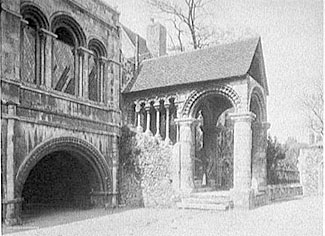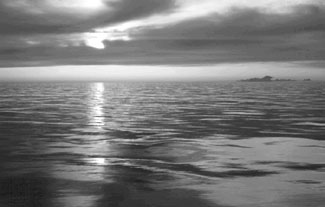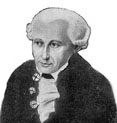by St. Anselm”
Canterbury Cathedral , Library of Congress, ©Detroit Publishing
About the author. . .
St. Anselm (1033-1109), a member of the Benedictine Order and Bishop
of Canterbury, extended the Augustine tradition of seeking to believe in
122
Chapter 10. “The Ontological Argument by St. Anselm”
order to understand the truth and existence of God rather that seeking to
understand in order to believe in the truth and existence of God. Even so,
St. Anselm does not distinguish clearly between religious and philosoph-
ical pursuits. Many theologians avoid trusting reason from the fear of the
specter of skepticism; however, Anselm believes reason is necessary to
elucidate and validate faith. Anselm is often considered to be the father of
scholastic philosophy since his work emphasizes linguistic and analytical
thinking. Scholasticism was the dominant approach to philosophical and
theological problems during the medieval period.
About the work. . .
Although Anselm’s argument for God’s existence presented in this article
is based on predominately on reason, Anselm presents the argument as
clarification Christian faith. The heart of his argument is the insight that
if God is defined as a “being than which no greater can be conceived,”
then God could not be conceived of as not existing because perfection, he
thinks, implies existence. Baruch Spinoza and René Descartes employed
versions of the ontological argument where the very concept of God as a
perfect being implies existence as a property. In philosophical jargon, a
feature of the essence of God is said to be existence.
From the reading. . .
“. . . we believe that you are a being of which nothing greater can be
conceived. . . ”
Ideas of Interest from the Proslogium
1. Explain whether you think St. Anselm believes understanding the na-
ture of religious belief is a necessary condition for believing in the
nature and existence of God.
Reading For Philosophical Inquiry: A Brief Introduction
123
Chapter 10. “The Ontological Argument by St. Anselm”
2. As clearly as possible, restate Anselm’s ontological argument.
3. Clearly explain what St. Anselm means when he writes there is only
one way God can be conceived not to exist.
4. Explain why, according to St. Anselm, only God and nothing else
cannot not exist? According to Anselm, why couldn’t other necessary
beings exist?
The Reading Selection from the Proslogium
Lord, I acknowledge and I thank you that you have created me in this your
image, in order that I may be mindful of you, may conceive of you, and
love you; but that image has been so consumed and wasted away by vices,
and obscured by the smoke of wrong-doing, that it cannot achieve that
for which it was made, except you renew it, and create it anew. I do not
endeavor, O Lord, to penetrate your sublimity, for in no wise do I compare
my understanding with that; but I long to understand in some degree your
truth, which my heart believes and loves. For I do not seek to understand
that I may believe, but I believe in order to understand. For this also I
believe, —that unless I believed, I should not understand. . . .
Truly there is a God, although the fool has said in his heart, There is no
God.
AND so, Lord, do you, who do give understanding to faith, give me, so
far as you knowest it to be profitable, to understand that you are as we
believe; and that you are that which we believe. And indeed, we believe
that you are a being than which nothing greater can be conceived. Or is
there no such nature, since the fool has said in his heart, there is no God?
( Psalms xiv. 1). But, at any rate, this very fool, when he hears of this
being of which I speak—a being than which nothing greater can be con-
ceived—understands what be hears, and what he understands is in his un-
derstanding; although he does not understand it to exist.
For, it is one thing for an object to be in the understanding, and another to
understand that the object exists. When a painter first conceives of what he
will afterwards perform, he has it in his understanding, but be does not yet
understand it to be, because he has not yet performed it. But after he has
made the painting, be both has it in his understanding, and he understands
that it exists, because he has made it.
124
Reading For Philosophical Inquiry: A Brief Introduction
Chapter 10. “The Ontological Argument by St. Anselm”
Hence, even the fool is convinced that something exists in the understand-
ing, at least, than which nothing greater can be conceived. For, when he
hears of this, he understands it. And whatever is understood, exists in the
understanding. And assuredly that, than which nothing greater can be con-
ceived, cannot exist in the understanding alone. For, suppose it exists in
the understanding alone: then it can be conceived to exist in reality; which
is greater.
From the reading. . .
“That which can be conceived not to exist is not God.”
Therefore, if that, than which nothing greater can be conceived, exists in
the understanding alone, the very being, than which nothing greater can
be conceived, is one, than which a greater can be conceived. But obvi-
ously this is impossible. Hence, there is doubt that there exists a being,
than which nothing greater can be conceived, and it exists both in the un-
derstanding and in reality. . . .
God cannot be conceived not to exist. —God is that, than which nothing
greater can be conceived. —That which can be conceived not to exist is
not God.
AND it assuredly exists so truly, that it cannot be conceived not to exist.
For, it is possible to conceive of a being which cannot be conceived not
to exist; and this is greater than one which can be conceived not to ex-
ist. Hence, if that, than which nothing greater can be conceived, can be
conceived not to exist, it is not that, than which nothing greater can be
conceived. But this is an irreconcilable contradiction. There is, then, so
truly a being than which nothing greater can be conceived to exist, that it
cannot even be conceived not to exist;. and this being you are, O Lord, our
God.
So truly, therefore, do you exist, O Lord, my God, that you can not be
conceived not to exist; and rightly. For, if a mind could conceive of a be-
ing better than you, the creature would rise above the Creator; and this is
most absurd. And, indeed, whatever else there is, except you alone, can
be conceived not to exist. To you alone, therefore, it belongs to exist more
truly than all other beings, and hence in a higher degree than all others.
Reading For Philosophical Inquiry: A Brief Introduction
125
Chapter 10. “The Ontological Argument by St. Anselm”
For, whatever else exists does not exist so truly, and hence in a less degree
it belongs to it to exist. Why, then, has the fool said in his heart, there is no
God ( Psalms xiv. 1), since it is so evident, to a rational mind, that you do
exist in the highest degree of all? Why, except that he is dull and a fool?
. . .
How the fool has said in his heart what cannot be conceived. —A thing
may be conceived in two ways: (1) when the word signifying it is con-
ceived; (2) when the thing itself is understood. As far as the word goes,
God can be conceived not to exist; in reality he cannot.
BUT how has the fool said in his heart what he could not conceive; or how
is it that he could not conceive what he said in his heart? since it is the
same to say in the heart, and to conceive.
But, if really, nay, since really, he both conceived, because he said in his
heart; and did not say in his heart, because he could not conceive; there
is more than one way in which a thing is said in the heart or conceived.
For, in one sense, an object is conceived, when the word signifying it is
conceived; and in another, when the very entity, which the object is, is
understood.
In the former sense, then, God can be conceived not to exist; but in the lat-
ter, not at all. For no one who understands what fire and water are can con-
ceive fire to be water, in accordance with the nature of the facts themselves,
although this is possible according to the words. So, then, no one who un-
derstands what God is can conceive that God does not exist; although he
says these words in his heart, either without any or with some foreign, sig-
nification. For, God is that than which a greater cannot be conceived. And
he who thoroughly understands this, assuredly understands that this being
so truly exists, that not even in concept can it be non-existent. Therefore,
he who understands that God so exists, cannot conceive that he does not
exist.
I thank you, gracious Lord, I thank you; because what I formerly believed
by your bounty, I now so understand by your illumination, that if I were
unwilling to believe that you do exist, I should not be able not to under-
stand this to be true.
126
Reading For Philosophical Inquiry: A Brief Introduction
Chapter 10. “The Ontological Argument by St. Anselm”
Related Ideas
Anselm of Canterbury (http://www.utm.edu/research/iep/a/anselm.htm)
Internet Encyclopedia of Philosophy . A summary of life, writings, and
theology of Anselm.
St. Anselm (http://www.newadvent.org/cathen/01546a.htm) Catholic En-
cyclopedia . An extensive historical background summary of St. Anselm’s
life and works by W. H. Kent.
Canterbury Cathedral, Norman Staircase , Library of Congress, ©Detroit
Publishing
Topics Worth Investigating
1. Anselm believes even a foolish person can understand the definition
of “God” as “a being than which nothing greater can be conceived.” Is
this phrase clear and distinct? For example, does a number than which
Reading For Philosophical Inquiry: A Brief Introduction
127
Chapter 10. “The Ontological Argument by St. Anselm”
no greater number can be conceived, exist in the same manner as any
given number is said to exist?
2. If an apple has the qualities of being red, fresh, round, and on a tree,
need we add an additional quality assuring the apple exists? Is exis-
tence a characteristic of things? In what way is something existing in
reality greater than something existing only in the mind?
3. Compare “being in the highest degree” with “existence in the highest
degree.” Is existence an ordinal or a cardinal property? Can a thing
partly or imperfectly exist?
128
Reading For Philosophical Inquiry: A Brief Introduction
Chapter 11
“An Answer to Anselm” by
Gaunilo
Abbey at Marmoutier , www.thais.it
129
Chapter 11. “An Answer to Anselm” by Gaunilo
About the author. . .
Gaunilo, a Benedictine monk of Marmoutier, expressed his objections to
Anselm’s argument by means of devising a logical analogy. Gaunilo’s ar-
gument appeared soon after the writing of the Proslogion and was ac-
cepted by many philosophers.
About the work. . .
Gaunilo replies to Anselm’s ontological argument in his Pro Insipiente 1
(a “take-off” of Anselm’s reference to the fool of Psalms ) that the use of
a concept does not imply that the concept has an existent reference. He
argues by analogy that many ideas are only hypothetical. Note how in a
later reading St. Thomas Aquinas agrees with Gaunilo’s analysis. Nathan
Salmon has observed, “Philosophers who address the questions of what
it is for an individual to exist, or what it is for an individual to be actual,
often do so with reference to the fallacy they have uncovered in the clas-
sical Ontological Argument for God’s existence. Indeed, the Ontological
Argument is useful as a vehicle by which this and other issues in ontology
and the philosophy of logic may be introduced and sharpened.”2
From the reading. . .
“This, in the mean time, is the answer the fool could make in the argu-
ments urged against him. . . ”
Ideas of Interest from Pro Insipiente
1. Restate in your own words, Gaunilo’s perfect island objection.
1.
Gaunilo. Pro Insipiente. “In Behalf of the Fool.” 1078.
2.
Nathan Salmon. “Existence” in Philosophical Perspectives: Metaphysics, Volume
1 . Edited by James E. Tomberlin. Atascadero, Calif.: Ridgeview Publishing Co, 1987, 49.
130
Reading For Philosophical Inquiry: A Brief Introduction
Chapter 11. “An Answer to Anselm” by Gaunilo
2. Does the concept of a being “than which no greater can be conceived”
differ from other kinds of concepts on the basis that this concept can-
not be conceived not to exist?
3. Does the ontological argument of Anselm or does the perfect island
objection of Gaunilo commit the fallacy of petitio principii ?
The Reading Selection from Pro Insipiente
For example: it is said that somewhere in the ocean is an island, which,
because of the difficulty, or rather the impossibility, of discovering what
does not exist, is called the lost island. And they say that this island has an
inestimable wealth of all manner of riches and delicacies in greater abun-
dance than is told of the Islands of the Blest; and that having no owner or
inhabitant, it is more excellent than all other countries, which are inhabited
by mankind, in the abundance with which it is stored.
Now if some one should tell me that there is such an island, I should easily
understand his words, in which there is no difficulty. But suppose that he
went on to say, as if by a logical inference: “You can no longer doubt
that this island which is more excellent than all lands exists somewhere,
since you have no doubt that it is in your understanding. And since it is
more excellent not to be in the understanding alone, but to exist both in
the understanding and in reality, for this reason it must exist. For if it does
not exist, any land which really exists will be more excellent than it; and
so the island already understood by you to be more excellent will not be
more excellent.”
If a man should try to prove to me by such reasoning that this island truly
exists, and that its existence should no longer be doubted, either I should
believe that he was jesting, or I know not which I ought to regard as the
greater fool: myself, supposing that I should allow this proof; or him, if
he should suppose that he had established with any certainty the existence
of this island. For he ought to show first that the hypothetical excellence
of this island exists as a real and indubitable fact, and in no wise as any
unreal object, or one whose existence is uncertain, in my understanding.
Reading For Philosophical Inquiry: A Brief Introduction
131
Chapter 11. “An Answer to Anselm” by Gaunilo
From the reading. . .
“. . . I know not which I ought to regard as the greater fool: myself,
supposing that I should allow this proof; or him. . . ”
This, in the mean time, is the answer the fool could make to the arguments
urged against him. When he is assured in the first place that this being is
so great that its non-existence is not even conceivable, and that this in turn
is proved on no other ground than the fact that otherwise it will not be
greater than all things, the fool may make the same answer, and say:
When did I say that any such being exists in reality, that is, a being greater
than all others?—that on this ground it should be proved to me that it also
exists in reality to such a degree that it cannot even be conceived not to
exist? Whereas in the first place it should be in some way proved that a
nature which is higher, that is, greater and better, than all other natures,
exists; in order that from this we may then be able to prove all attributes
which necessarily the being that is greater and better than all possesses.
[The Island] , NOAA, John Bortnaik
132
Reading For Philosophical Inquiry: A Brief Introduction
Chapter 11. “An Answer to Anselm” by Gaunilo
Moreover, it is said that the non-existence of this being is inconceivable. It
might better be said, perhaps, that its non-existence, or the possibility of its
non-existence, is unintelligible. For according to the true meaning of the
word, unreal objects are unintelligible. Yet their existence is conceivable
in the way in which the fool conceived of the non-existence of God. I
am most certainly aware of my own existence; but I know, nevertheless,
that my non-existence is possible. As to that supreme being, moreover,
which God is, I understand without any doubt both his existence, and the
impossibility of his non-existence. Whether, however, so long as I am most
positively aware of my existence, I can conceive of my non-existence, I
am not sure. But if I can, why can I not conceive of the non-existence
of whatever else I know with the same certainty? If, however, I cannot,
God will not be the only being of which it can be said, it is impossible to
conceive of his non-existence.
From the reading. . .
“Moreover, it is said that the non-existence of this being is inconceiv-
able. It might better be said, perhaps, that its non-existence. . . is unin-
telligible.”
Related Ideas
Existence (http://plato.standford.edu/entries/existence/) An excellent his-
torical summary of the topic of “existence” in the Standford Internet En-
cyclopedia of Philosophy .
Ontological Arguments (http://http://plato.stanford.edu/entries/ontological-
arguments/) Summary of all ontological arguments including recent work
by the Standford Internet Encyclopedia of Philosophy .
Reading For Philosophical Inquiry: A Brief Introduction
133
Chapter 11. “An Answer to Anselm” by Gaunilo
Abbey Ruins at Marmoutier, France
Topics Worth Investigating
1. Do you think that Gaunilo would agree the following objection applys
to Anselm’s Ontological Argument?
Nothing is demonstrable unless the contrary implies a contradiction.
Nothing that is distinctly conceivable implies a contradiction. Whatever
we can conceive as existent, we can also conceive of as nonexistent.
There is no being whose non-existence implies a contradiction. Conse-
quently there is no being whose existence is demonstrable.3
2. Explain the differences between “inconceivable” and “unintelligible.”
3.
David Hume. Dialogues Concerning Natural Religion. 1779.
134
Reading For Philosophical Inquiry: A Brief Introduction
Chapter 12
“Existence Is Not a
Predicate” by Immanuel
Kant
Immanuel Kant , Thoemmes
About the author. . .
Immanuel Kant (1724-1804) studied in Königsberg, East Prussia. Before
he fully developed an interest in philosophy, he was fascinated with
physics and astronomy—in fact, he anticipated William Herschel’s
discovery of Uranus by a few years. Kant’s critical philosophy, one of
the truly profound philosophies in the history of Western Civilization,
was constructed to forge empiricism and rationalism into a “critical”
philosophy which sought to overcome the many pressing shortcomings of
each. What we call objective reality, Kant argues, is subject to whatever
conforms to the structures of our perception and thinking. Virtually every
135
Chapter 12. “Existence Is Not a Predicate” by Immanuel Kant
epistemological theory since Kant, directly or indirectly, is oriented in
reference to his The Critique of Pure Reason .
About the work. . .
In “Section IV. Of the Impossibility of an Ontological Proof of the Exis-
tence of God,” 1 drawn from his Critique , Kant addresses the logical problem of existential import. How do we talk or think about things without
supposing, in some sense at least, that they exist? Bertrand Russell ex-
pressed one aspect of the problem this way: If it’s false that the present
King of France is bald, then why doesn’t this fact imply that it’s true the
present King of France is not bald? When the existence of the subjects of
our statements are in question, the normal use of logic becomes unreli-
able. Kant argues that the use of words (or “predicates”) alone does not
necessarily imply the existence of their referents. We can only assume the
existence of entities named by our words; we cannot prove “existence” by
means of the use of language alone.
From the reading. . .
“Being is evidently not a real predicate, that is, a conception of some-
thing which is added to the conception of some other thing. ”
Ideas of Interest from The Critique of Pure
Reason
1. Define the term “á priori judgment” with the help of a dictionary, and
give several different examples of an á priori judgment.
1.
Immanuel Kant, The Critique of Pure Reason . Trans. J. M. D. Meiklejohn. 1781.
Bk.2 Ch. 3 § IV, ¶ 55.
136
Reading For Philosophical Inquiry: A Brief Introduction
Chapter 12. “Existence Is Not a Predicate” by Immanuel Kant
2. Use a good dictionary to define the term “analytic judgment,” and
give several different examples. Is there any difference between an
analytic judgment and a tautology?
3. Construct a good definition of the term “synthetic judgment,” and give
several examples.
4. What is Kant’s argument that “existence is not a predicate”? How
does this argument relate to Anselm’s Ontological argument?
The Reading Selection from The Critique of
Page 1 Page 2 Page 3 Page 4 Page 5 Page 6 Page 7 Page 8 Page 9 Page 10 Page 11 Page 12 Page 13 Page 14 Page 15 Page 16 Page 17 Page 18 Page 19








